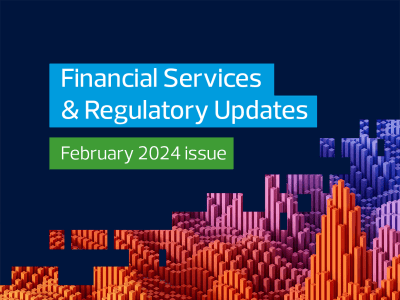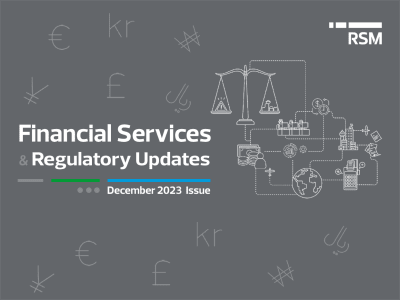We researched and summarised for you, all recent regulatory updates from Cyprus and Europe, which are applicable for Regulated Companies operating in the Region.
We support our clients and associates by providing a comprehensive page with the recent circulars, directives, and guidance issued by the following Regulators:
05/03/2024 - C622 - U.S. Sanctions Guidance
CySEC informs the Regulated Entities that the Office of Foreign Assets Control (OFAC), on 22 December 2023, issued a Sanctions Advisory titled “Guidance for Foreign Financial Institutions on OFAC Sanctions Authorities Targeting Support to Russia’s Military-Industrial Base” (the ‘Sanctions Advisory’). The OFAC published this Sanctions Advisory to alert foreign financial institutions that the conduct or facilitation of significant transactions or providing any service involving Russia’s military-industrial base runs the risk of being sanctioned by OFAC.
C622 - U.S. Sanctions Guidance
24/03/2024 - C620 - C623 -Suspension of redemption of UCITS and AIF units on 29 March and 1 April 2024
CySEC informs Regulated Entities that the redemption of UCITS and AIF units is suspended on 29 March and 1 April 2024. It is provided that the suspension refers to UCITS and AIFs that hold assets in transferable securities listed in regulated markets and whose net asset value is calculated daily.
C623 - Suspension of redemption of UCITS and AIF units on 29/03/2024 & 01/04/2024
04/03/2024 Directive on the operation of the Central Information Register for the Issuers of Dishonored Cheques of 2024.
CBC announces the publication of the Directive on the operation of the Central Information Register for the Issuers of Dishonoured Cheques of 2024 in the Official Gazette of the Republic dated 01/03/2024 (O.G. Third Annex (I) R.A.A. 67/2024, No. 5859).
13/03/2024 - Changes to the operational framework for implementing monetary policy
The Governing Council of the ECB decided to make changes to the operational framework for implementing monetary policy. These changes will affect how central bank liquidity will be provided as excess liquidity in the banking system, while remaining significant over the coming years, gradually declines. The purpose of the operational framework is to steer short-term money market rates closely in line with the Governing Council’s monetary policy decisions.
ECB announcement - Operational framework changes on monetary policy
18/03/2024 - ECB and EBA step up efforts to make banking industry data reporting more efficient
ECB and EBA aim to harmonise and integrate the banking industry's data reporting to improve efficiency and reduce associated costs. To this end, the two institutions established the Joint Bank Reporting Committee (JBRC), which is tasked with helping to develop common definitions and standards for the data that banks are required to report for statistical, supervisory, and resolution purposes.
ECB & EBA announcement - Banking industry reporting
21/03/2024 - Denmark joins T2 and TIPS to fully integrate the Danish krone into Eurosystem’s payment services.
ECB and Danmarks National Bank signed an agreement for Denmark to join the ECB’s T2 wholesale payment system and the TARGET Instant Payment Settlement (TIPS) service. This will facilitate the settlement of high-value payments in euro and Danish kroner in the T2 system and will make the Danish krone the third currency available for settlement in TIPS after the Swedish krona was included earlier this year.
Announcement - Danish krone in Eurosystem’s payment services
04/03/2024 - The EBA consults on draft technical standards on off-balance sheet items under the standardized approach of credit risk
The European Supervisory Authorities (EBA, EIOPA, and ESMA – the ESAs) published a report describing the results of a stocktake of BigTech direct financial services provision in the EU. The Report identifies the types of financial services currently carried out by BigTechs in the EU according to EU licences and highlights inherent opportunities, risks, and regulatory and supervisory challenges. The ESAs will continue to strengthen the monitoring of the relevance of BigTech in the EU financial services sector, including via the establishment of a new monitoring matrix.
Technical standards on off-balance sheet items
05/03/2024 - The EBA publishes its final Guidelines on national lists or registers of credit servicers.
EBA published its final Guidelines on national lists or registers of credit servicers. The Guidelines are addressed to Competent Authorities managing the lists or registers and specify:
i) the content of the lists or registers,
ii) how they should be made accessible, and
iii) the deadlines for updating them.
Furthermore, the lists or registers should facilitate borrowers’ access to information on complaint-handling procedures offered by competent authorities. The Guidelines require basic information about credit servicers, such as their name and address and home Member State, as well as other useful information, such as whether the credit servicer is currently authorized to conduct services or to receive and hold funds from borrowers.
Final Guidelines - National Lists - Registers of Credit Servicers
08/03/2024 - The EBA consults on Guidelines on redemption plans under the Markets in Crypto-Assets Regulation
EBA launched a consultation on the Guidelines for the plans to orderly redeem asset-referenced or e-money tokens in the event that the issuer fails to fulfil its obligations under the Markets in Crypto Assets Regulation (MiCA). The Guidelines specify the content of the redemption plan, the timeframe for review and the triggers for its implementation. The Guidelines are addressed to issuers of asset-referenced to-kens (ART) and of e-money tokens (EMT), and to competent authorities under MiCA. The consultation runs until 10 June 2024.
Guidelines on redemtpion plans - Crypto-Assets Regulation
13/03/2024 - The EBA publishes the final draft of technical standards on complaints handling for issuers of asset-referenced tokens
EBA published the final draft of Regulatory Technical Standards (RTS) that set out the requirements, templates and procedures for handling complaints received by issuers of asset reference tokens (ARTs). The draft RTS fulfil a mandate conferred on the EBA in the Markets in Crypto-Assets Regulation (MiCA) and were developed in close cooperation with the European Securities and Markets Authority (ESMA). The draft RTS set out requirements related to the complaints management policy and function, the provision of information to holders of ARTs and other interested parties, templates, recordings, languages, the procedure to investigate complaints and to communicate the outcome of the investigations to complainants, and specific provisions for complaints handling involving third-party entities.
Final draft technical standards on complaints handling
20/03/2024 - EBA updates the list of institutions involved in the 2024 supervisory benchmarking exercise
EBA published an updated list of institutions that have a reporting obligation for the purpose of the 2024 EU supervisory benchmarking exercise. The EBA will be conducting the 2024 benchmarking exercise on a sample of 110 institutions from 16 countries across the EU and the European Economic Area. The EBA runs this exercise leveraging on established data collection procedures and formats of regular supervisory reporting and assists Competent Authorities in assessing the quality of internal approaches used to calculate risk-weighted exposure amounts.
22/03/2024 - EBA issues revised list of ITS validation rules
EBA issued a revised list of validation rules in its Implementing Technical Standards (ITS) on supervisory reporting, highlighting those that have been deactivated either for incorrectness or for triggering IT problems. Competent Authorities throughout the EU have been informed that data submitted in accordance with these ITS should not be formally validated against the set of deactivated rules.
EBA revised list of ITS validation rules
25/03/2024 – The EBA launches a call for papers for its 2024 Policy Research Workshop
EBA launched a call for papers in view of its 13th Policy Research Workshop, taking place on 6-7 November 2024 and titled “Boundaries of Banking Regulation”. The deadline for submitting papers is 5 July 2024. The workshop aims to bring together economists and researchers from supervisory authorities and central banks, as well as leading academics, to discuss and explore policies that can ensure innovation in the context of competition and risk arbitrage, while ensuring financial stability.
Call for papers - 2024 Policy Research Workshop
01/03/2024 – ESMA publishes the results of the annual transparency calculations for equity-like instruments
ESMA published the results of the annual transparency calculations for equity and equity-like instruments, which will apply from 1 April 2024.
The calculations made available include:
- the liquidity assessment as per Articles 1 to 5 of CDR 2017/567;
- the determination of the most relevant market in terms of liquidity as per Article 4 of CDR 2017/587 (RTS 1);
- the determination of the average daily turnover relevant for the determination of the pre-trade and post-trade large in scale thresholds.
- the determination of the average value of the transactions and the related the standard market size; and
- the determination of the average daily number of transactions on the most relevant market in terms of liquidity relevant for the determination of the tick-size regime.
21/03/2024 - T+1 feedback report shows mixed impacts of shortening the settlement cycle in the EU
ESMA, published the feedback received to its Call for Evidence on shortening the settlement cycle.
In the report, ESMA summarizes the feedback from market participants during the consultation, focused on four areas:
- Many operational impacts beyond adaptations of post-trade processes are identified as resulting from a reduction of the securities settlement cycle in the EU.
- Respondents identified a wide range of both potential costs and benefits of a shortened cycle, with some responses supporting a thorough impact assessment before deciding.
- Respondents provided suggestions around how and when a shorter settlement cycle could be achieved, with a strong demand for a clear signal from the regulatory front at the start of the work and clear coordination between regulators and the industry.
- Stakeholders made clear the need for a proactive approach to adapt their own processes to the transition to T+1 in other jurisdictions. Some responses warned about potential infringements due to the misalignment of the EU and North America settlement cycles, that ESMA is currently assessing.
27/03/2024 - ESMA provides market participants with guidance on the clearing obligation for trading with 3rd country pension schemes
ESMA issued a public statement on deprioritizing supervisory actions linked to the clearing obligation for third-country pension scheme arrangements (TC PSA), pending the finalization of the review of EMIR. During this period and in view of the challenges that market participants would face, ESMA expects National Competent Authorities (NCAs) not to prioritize supervisory actions in relation to the clearing obligation for derivative transactions conducted with TC PSAs exempted from the clearing obligation under their third-country’s national law. Additionally, ESMA recommends that NCAs apply their risk-based supervisory powers in their day-to-day enforcement of applicable legislation in this area in a proportionate manner. The Council and the European Parliament reached a provisional agreement on 7 February 2024. The political agreement on the EMIR 3 text provides for an exemption regime from the EMIR clearing obligation when the TC PSA is exempted from the clearing obligation under that third country’s national law.
3rd country pension schemes - Guidelines





